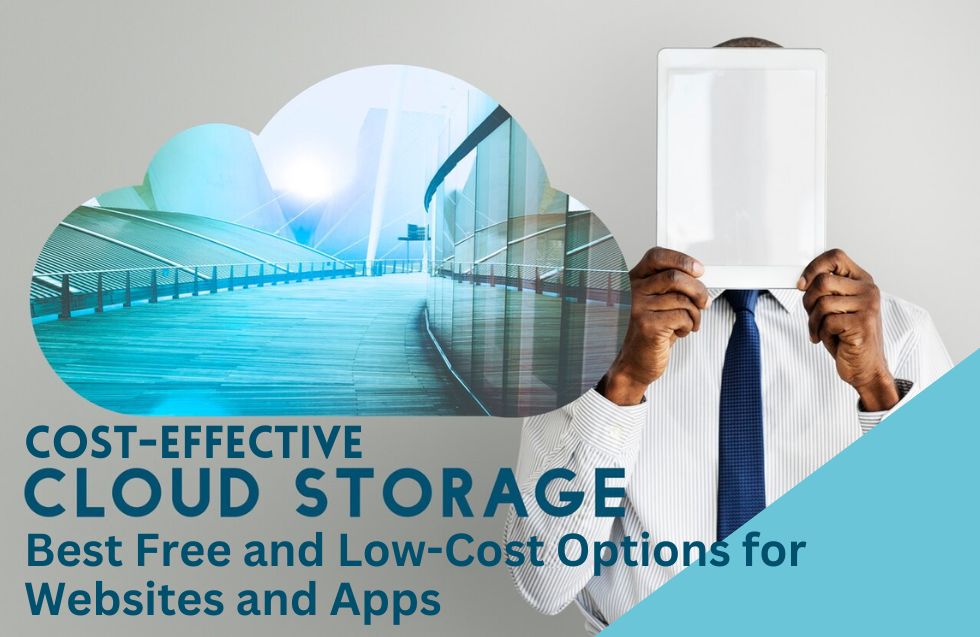In today’s digital age, having a reliable and scalable storage solution is crucial for businesses, especially for those managing websites and apps that handle substantial data and user interactions. However, with the costs associated with running a business already high, many startups and small businesses seek cloud storage solutions that won’t break the bank. Fortunately, there are free and low-cost cloud storage options designed to fit various needs, from simple file storage to more complex application hosting. This article explores some of the best free and budget-friendly cloud storage solutions, detailing how they stack up in terms of cost, features, and scalability.
The Demand for Cloud Storage in a Digital-First World
With the global shift towards digitalization, cloud storage demand has grown dramatically. According to a report by Fortune Business Insights, the global cloud storage market was valued at $76.43 billion in 2021 and is projected to grow to $390.33 billion by 2028, at a compound annual growth rate (CAGR) of 26.2%. This surge is driven by businesses’ need to store, manage, and process vast amounts of data remotely.
For small businesses, startups, or individual developers, cloud storage allows them to leverage enterprise-level technology at minimal costs. Free and low-cost options make it feasible for these organizations to access secure and scalable storage without heavy financial investment, making cloud storage essential for growth, scalability, and overall business resilience.
1. Google Cloud Platform (GCP): Free Tier and Budget-Friendly Options
Overview and Pricing Google Cloud Platform (GCP) offers a free tier that is ideal for startups and developers looking to experiment with cloud storage. New users receive $300 in credits, valid for 90 days, which can be used across GCP’s various services. For permanent free storage, GCP offers 5GB of Google Cloud Storage and additional tools, such as BigQuery for data analytics.
Features GCP’s free tier includes scalable object storage, which can be leveraged by websites and applications to store images, videos, and other unstructured data. Google also offers reliable security measures, including encryption and access control, making it suitable for businesses that prioritize data security.
Ideal Use Case The free tier of GCP is suitable for small websites and applications with moderate storage needs. It’s also a good starting point for businesses that plan to scale in the future, as GCP offers seamless upgrades to more robust storage plans as data needs grow.
2. Amazon Web Services (AWS): Scalable Options for Growing Businesses
Overview and Pricing Amazon Web Services (AWS) is one of the most popular and reliable cloud platforms, offering both free and low-cost storage options. AWS’s Free Tier includes 5GB of Amazon S3 Standard storage for the first 12 months and 750 hours of EC2 (Elastic Compute Cloud) use, which is helpful for hosting applications. For long-term use, AWS offers various tiers with pricing as low as $0.023 per GB per month for S3 Standard.
Features AWS S3 provides high durability (99.999999999% or “11 nines”), data encryption, and customizable access management. It’s highly scalable, making it ideal for businesses planning to expand their storage over time. AWS also offers other solutions such as Glacier, a low-cost, long-term storage option that costs $0.004 per GB per month.
Ideal Use Case AWS’s free tier and scalable pricing are ideal for startups and small businesses that require flexibility in storage. It’s also beneficial for companies that foresee data archiving needs, as they can shift older data to AWS Glacier for substantial cost savings.
3. Microsoft Azure: Flexible and Feature-Rich for Developers
Overview and Pricing Microsoft Azure offers a free tier that includes 5GB of Blob storage and 750 hours of B1 Virtual Machine, which is helpful for light web applications. Additionally, new users get $200 in free credits for the first 30 days. Azure’s pay-as-you-go pricing for storage starts at $0.0184 per GB per month for standard Blob storage, making it competitive with other leading providers.
Features Azure is known for its robust infrastructure, offering a variety of storage solutions such as Blob (object) storage, file storage, and database options. It also includes a robust set of developer tools, making it highly suitable for startups in development-heavy environments.
Ideal Use Case Azure’s free and low-cost options are ideal for small businesses that use Microsoft’s suite of tools or those seeking to integrate with popular applications like Office 365. Azure is particularly beneficial for developers building apps that need efficient cloud-based data management.
4. Dropbox Business: Simplified Cloud Storage for Collaboration
Overview and Pricing Dropbox is often associated with personal cloud storage but also offers solutions for businesses. Dropbox’s free tier includes 2GB of storage, and its business plans start at $12.50 per user per month with 5TB of storage. While not as generous as other cloud providers, Dropbox shines in its collaborative tools and user-friendly interface.
Features Dropbox Business is highly collaborative, offering shared folders, real-time editing, and third-party app integrations. It’s designed with a user-friendly interface that makes it easy to manage files and collaborate, making it an excellent choice for teams working remotely.
Ideal Use Case Dropbox Business is ideal for startups or small teams needing an affordable, simple cloud storage solution focused on collaboration. However, it may not be suitable for data-intensive applications, as the storage pricing can be higher than AWS or GCP.
5. iDrive: Affordable Backup Solution for Small Businesses
Overview and Pricing iDrive is a cloud storage provider primarily focused on backup services. It offers 10GB for free and competitively priced business plans. For instance, users can get 5TB of storage for $79.50 per year, which breaks down to around $0.0013 per GB per month.
Features iDrive provides continuous and scheduled backups, real-time file syncing, and easy file restoration options. Additionally, iDrive’s security measures include 256-bit AES encryption, making it a viable option for businesses with sensitive data.
Ideal Use Case iDrive is particularly suitable for small businesses looking for affordable storage that prioritizes backup and data protection. It’s also ideal for businesses in regulated industries, such as healthcare, that require secure storage for compliance purposes.
6. Box: Secure Collaboration for Teams
Overview and Pricing Box offers 10GB of free storage for individual users and competitive pricing for business plans. Business plans start at $5 per user per month for 100GB of storage and go up to unlimited storage with advanced security features for $15 per user per month.
Features Box is well-known for its collaboration features, allowing teams to edit files in real time, leave comments, and set permissions for shared folders. It also integrates well with other software such as Microsoft Office and Google Workspace, making it ideal for businesses that rely on these tools for daily operations.
Ideal Use Case Box is ideal for small to mid-sized businesses focused on collaboration, particularly if they prioritize security and easy integration with other office productivity tools.
Choosing the Right Option for Your Business Needs
With so many cost-effective cloud storage solutions available, the right choice depends on your business’s unique needs. Here are a few considerations to guide the decision:
- Scalability Needs: For businesses expecting rapid data growth, AWS, GCP, and Azure offer robust scalability options, allowing for easy storage upgrades as data needs increase.
- Budget: For tight budgets, iDrive and Dropbox offer cost-effective options for basic storage, while AWS Glacier provides an affordable solution for long-term storage.
- Security Requirements: iDrive and Box provide additional security features that may appeal to businesses handling sensitive data.
- Ease of Use: Dropbox and Box are known for their user-friendly interfaces, making them ideal for businesses focused on collaboration without a heavy tech focus.
Conclusion
The rise of cloud storage has empowered small businesses and startups by providing access to scalable, secure, and affordable storage solutions. With options ranging from Google Cloud’s free tier to Box’s collaborative tools, there’s a solution for every business need and budget. By assessing factors such as scalability, budget, and security, businesses can choose a storage solution that supports their growth without sacrificing cost-efficiency. Whether you’re a startup looking for free storage to get started or an established business needing a scalable solution, today’s cloud storage options make it easier than ever to find the right fit.













